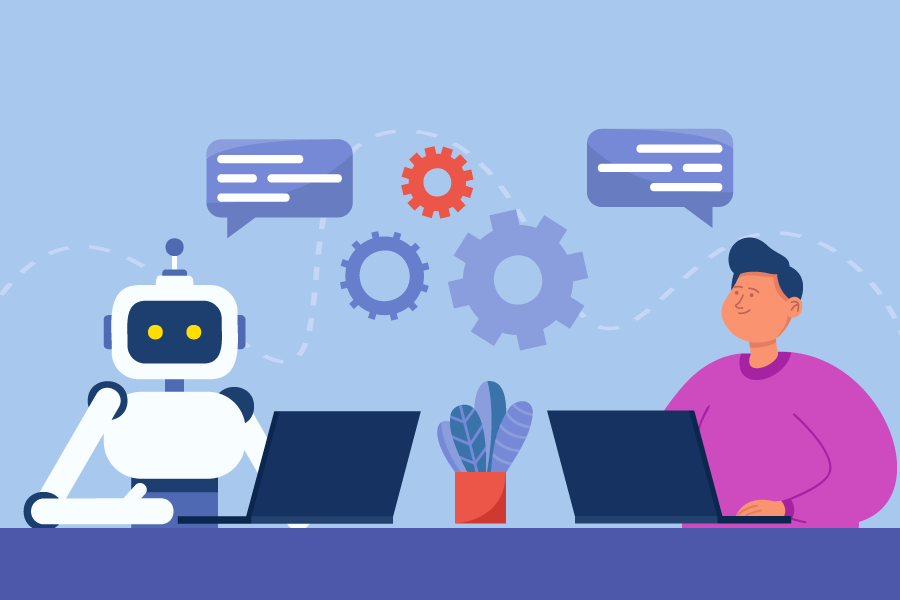AI is already indispensable in influencer marketing. From scouting for the right influencers and detecting sentiment to analysing influencer content and predicting campaign performance, AI powers some of the most effective influencer marketing solutions and most successful campaigns.
Now it is generative artificial intelligence (AI) that is turning heads – and it hasn’t taken long for ‘Big Tech’ to get involved. Microsoft’s $10bn investment in OpenAI and Google’s hurried release of ‘Bard’ illustrate that this tool could open a whole new world of innovation.
But whilst generative AI’s speed and capabilities have drawn praise, it’s not without its limitations. The reality is that no tech tool can recreate the human ability to come up with fresh, unique ideas. While AI’s tone-of-voice might work well for standard content creation, it can’t deliver the exciting, engaging and emotional content produced by the most successful influencers. Or can it?

Photo: freepik.com
What we shouldn’t forget is that generative AI is trained on billions of public code and imagery created by humans, including social media content. More recently, we are starting to see court cases of artists suing generative AI companies for training their tools on copyrighted property without permission. As debates surrounding who owns the intellectual property of generative AI’s content continue to heat up – a US-based university has developed a tool which blocks AI from learning an artist’s particular style.
This poses two questions: how can creators harness generative AI and use it to their advantage? And how will creators be credited for their work being used to train the algorithm?
Generative AI – an opportunity for creators
OpenAI’s ChatGPT has shown it can be an effective content brainstorming and workflow optimisation tool. A simple text input can open the door to thousands of content ideas. But this strategy isn’t risk-free. While the technology is rapidly evolving there are issues with its accuracy and potential to spread misinformation.
Cast your eye over the AI-oriented stories that have gone viral. Ryan Reynolds’ ad for Mint Mobile stole the headlines thanks to its ChatGPT-written script. An American created a children’s book with assistance from ChatGPT and Midjourney (an AI image generator). While the impressive technology enabled these creations, it was the humans at the heart of the stories that made them relatable.
That said, there is another movement that should not be underestimated – the rise of virtual influencers. According to Forbes, 58% of people follow at least one virtual influencer, with 35% of consumers having purchased a product promoted by a virtual influencer. These AI-generated influencers are not constrained by geography, can create content at scale and thus rapidly grow their follower base. They can not only help brands reach more audiences and verticals, but also give them more ownership of the creative process. Major luxury brands like Prada and Balmain are already partnering with virtual influencers and we will only continue to see a rise in these types of partnerships.
Influencers’ strengths lie in leveraging their personality to engage in meaningful conversations with their communities. They build communities based on a foundation of trust and human connection via active dialogue that makes use of bespoke, personalised content. As the quality of ad content decreases due to the oversaturation of the advertising market, creators’ ability to understand their communities, build trust and authenticity and create personalised content is key to their success. The brands that effectively tap into their approach can benefit from their close connections with their audience and boost brand desirability and return on investment.
While an influencer’s connection with their communities cannot be replicated by generative AI, the technology can be used to their advantage. Generative AI can help improve the efficiency of creators’ research and content generation process and free up time for them to focus on developing their personalised brand and making sure their content creates the desired trusted connection.
Influencers will adapt to the technologies available to help them in their creative process. AI will also continue to augment and increase the effectiveness of influencer-led strategies.
The opportunity for brands
Brands can deploy AI in three ways to support their influence marketing campaigns:
-
Influencer discovery and selection
-
Content creation
-
Campaign effectiveness evaluation and optimisation
-
Assigning AI and machine learning to oversee influencer selection negates the need for manual searches and ensures that brands have a pool of vetted influencers to choose from.
AI’s greater reach allows brands to discover strong-performing influencers that may have previously been overlooked and “moneyball”* their influencer marketing strategies.
Advanced selection criteria, ranging from audience demographics to engagement rate and previous campaign performance, free up time for marketers to focus on the creative process.

Photo: freepik.com
From a content standpoint, generative AI can also aid influencers in creating SEO-friendly product and brand copy as well as generate graphics that can enhance the appeal of their posts.
This all contributes to greater campaign efficiency. AI can analyse the data from live influencer campaigns far quicker than a human team – and with more accuracy. The technology can identify patterns to optimise performance as well as predict future performance.
Embracing influencer-led campaigns that work in harmony with AI is key to unlocking new, long-term relationships with your audience.
The future of generative AI
Generative AI’s seismic impact in just a few months shows that it is here to stay. Beyond the initial excitement and long-term opportunities, researchers and journalists are now raising valid concerns and implications that will require thoughtful responses from not only the tech and advertising industry, but also from policy makers on how we want to embed it in our lives.
* Applying advanced analytics to a domain to improve outcomes. Cited by Michael Lewis in his bestseller book “Moneyball: The Art of Winning an Unfair Game”.